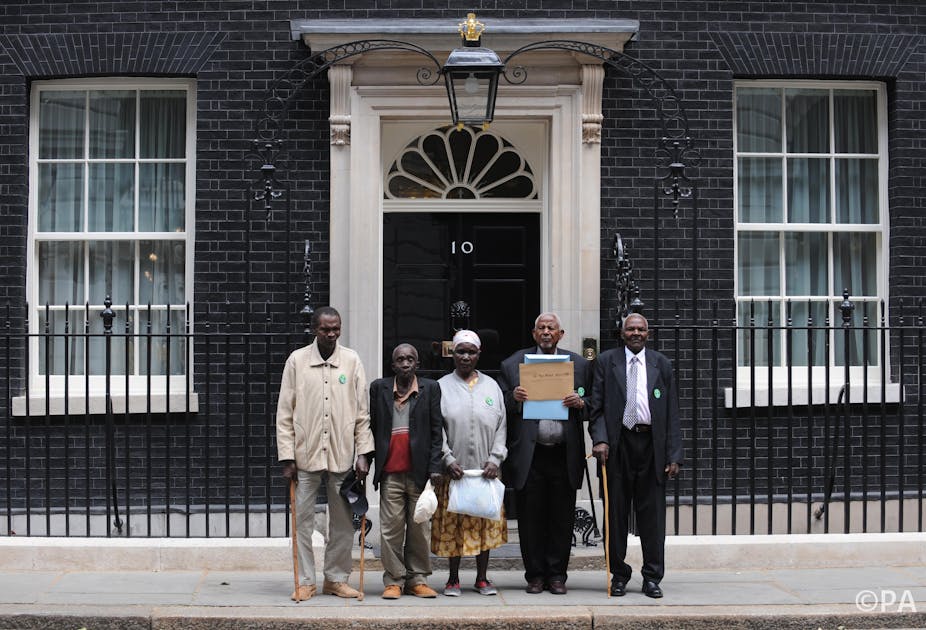Years of academic detective work broke through a “wall of silence” maintained for decades by successive governments over the torture and systematic abuse of Mau Mau freedom fighters in the dying days of Britain’s colonial rule in Kenya.
Research by David Anderson of Warwick University uncovered a cache of documents, hidden for more than half a century by British governments, which detailed systematic torture and abuse of Mau Mau freedom fighters during the 1950s Kenya Emergency.
The information enabled London law firm Leigh Day, assisted by Professor Anderson and fellow historians Caroline Elkins of Harvard University and Huw Bennett of Aberystwyth University to mount a legal case on behalf of the victims.
The government has announced it will pay £14 million in compensation to about 5,200 survivors of wrongful imprisonment and abuse during the Kenyan Emergency which ran from 1952 to 1959. The announcement by foreign secretary William Hague, comes after half a century in which governments refused to admit that Britain had sanctioned torture and other abuse in Kenya.
The apology and compensation come after a three-year legal battle brought by four survivors of torture at the hands of the British colonial authorities.
Hague’s decision a ‘game-changer’
Professor Anderson said the decision by Mr Hague to order the release of the documents had been a “game-changer” in getting justice for the former Mau Mau freedom fighters.
“The key moment was the decision by William Hague to release the documents. That was the game changer. As soon as Hague realised these documents were real, he very quickly sized the situation up and responded in not just a positive way, but a really constructive way.”

Professor Anderson said he had discovered the existence of the documents while researching his 2005 book, Histories of the Hanged, about the trials and executions of Mau Mau fighters convicted of terrorist offences during the uprising. Successive governments had denied the existence of these documents until, in 2010, the historian wrote a witness statement giving details of how the documents had been repatriated and hidden in Britain.
“I knew which flight they had left Kenya on, when and where they had arrived at Gatwick, who met the plane. The judge more or less threatened to hold the government in contempt unless they were released.
"Examining the documents, we found out that this wasn’t just the actions of random individuals - the notorious ‘bad apples in the barrel’ but it was actually a systemic problem that included instructions given to camp commandants about what they should do about so-called recalcitrants. And those instructions amounted to orders to use something called ‘compelling force’. And compelling force, in anybody’s book, was torture.”
This information had been hidden for five decades. In 1959 after a massacre at the Hola detention camp, in which 11 inmates of a camp were beaten to death by guards and a further 77 received serious injuries, a group of Labour and Liberal MPs called for a full inquiry. This attempt was narrowly blocked by the then prime minister, Harold Macmillan who enforced a three-line whip to ensure an inquiry wasn’t held.
The decision, taken at about this time, to quit Kenya and the africanisation of government that took place over the intervening four years leading to independence meant that the issue receded.
It wasn’t until a group of four - now elderly - torture victims, assisted by UK law firm Leigh Day, began in 2002 to build a case against the government that the issue resurfaced. Late last year the High Court gave the surviving victims, Wambuga Wa Nyingi, Jane Muthoni Mara and Paulo Muoka Nzili, leave to sue the British government.
Decision paves the way for further cases

Professor Anderson said the decision would open up the possibility of further similar cases, but added that Kenya was the only former colony he was aware of where such systemic abuse existed.
“There are two important points to make. This case has blazed a trail through a legal thicket. Cases of this kind did not have a clear route to resolution - it was not even apparent whose jurisdiction they should be heard in. Now it is clearly established what you can do with a colonial historical crimes case. This will open up a pathway for others to follow. This is something Mr Hague and his colleagues will be a bit worried about.
"But what will give them solace is the fact that Kenya is exceptional. There are not 15 other Kenyas in the shrubbery. Kenya was on a scale that no other British colony matched. I’m sure there were unpleasant things happened in other places and there may be individual incidents of torture and other abuses - colonialism is a coercive thing. But I don’t think we will find systemic abuse, that is behaviour that is sanctioned by the state itself.”

